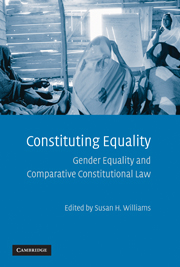Book contents
- Frontmatter
- Contents
- List of Contributors
- Acknowledgments
- CONSTITUTING EQUALITY
- Introduction: Comparative Constitutional Law, Gender Equality, and Constitutional Design
- SECTION ONE STRUCTURE
- SECTION TWO RIGHTS
- SECTION THREE CULTURE/RELIGION AND GENDER EQUALITY
- SECTION FOUR CONSTITUTIONS AND INTERNATIONAL LAW
- 10 Constitutional Incorporation of International and Comparative Human Rights Law: The Colombian Constitutional Court Decision C-355/2006
- 11 Guatemalan Transnational Feminists: How Their Search for Constitutional Equality Interplays with International Law
- SECTION FIVE WOMEN IN THE PROCESS OF CONSTITUTION MAKING
- Conclusion: Gender Equality and the Idea of a Constitution: Entrenchment, Jurisdiction, and Interpretation
- Index
- References
10 - Constitutional Incorporation of International and Comparative Human Rights Law: The Colombian Constitutional Court Decision C-355/2006
Published online by Cambridge University Press: 26 October 2009
- Frontmatter
- Contents
- List of Contributors
- Acknowledgments
- CONSTITUTING EQUALITY
- Introduction: Comparative Constitutional Law, Gender Equality, and Constitutional Design
- SECTION ONE STRUCTURE
- SECTION TWO RIGHTS
- SECTION THREE CULTURE/RELIGION AND GENDER EQUALITY
- SECTION FOUR CONSTITUTIONS AND INTERNATIONAL LAW
- 10 Constitutional Incorporation of International and Comparative Human Rights Law: The Colombian Constitutional Court Decision C-355/2006
- 11 Guatemalan Transnational Feminists: How Their Search for Constitutional Equality Interplays with International Law
- SECTION FIVE WOMEN IN THE PROCESS OF CONSTITUTION MAKING
- Conclusion: Gender Equality and the Idea of a Constitution: Entrenchment, Jurisdiction, and Interpretation
- Index
- References
Summary
INTRODUCTION
In 2006, the Constitutional Court of Colombia declared unconstitutional a statute criminalizing abortion under all circumstances. The Court ruled that abortion should be legally permitted when:
the continuation of pregnancy presents a risk to the life or physical or mental health of the woman;
there are serious malformations that make the fetus nonviable; or
the pregnancy is the result of a criminal act of rape, incest, unwanted artificial insemination or unwanted implantation of a fertilized ovum.
The Court held that banning abortion to protect fetal interests in these cases would violate women's fundamental rights, because criminalization under such circumstances places a disproportionate burden on women's exercise of human rights protected by the 1991 Colombian Constitution and by international human rights law.
This paper analyzes how the Court protected the rights of pregnant women in the abortion context by incorporating regional and international human rights law within its judicial review of the abortion legislation, giving constitutional status to human rights treaties ratified by Colombia. It also describes the reasoning of the Court regarding the status of the unborn under Colombian and international law, the way the Court balanced the constitutionally required protection of the unborn with the rights of women, and the borrowings the Court made of comparative law and jurisprudence. It explains how the Court enriched the meaning of the dignity of women by interpreting constitutional provisions in light of international human rights sources with a feminist perspective, and laid a foundation for protecting the reproductive rights of women in countries that are parties to the treaties on which the Court relies.
- Type
- Chapter
- Information
- Constituting EqualityGender Equality and Comparative Constitutional Law, pp. 215 - 247Publisher: Cambridge University PressPrint publication year: 2009
References
- 5
- Cited by

